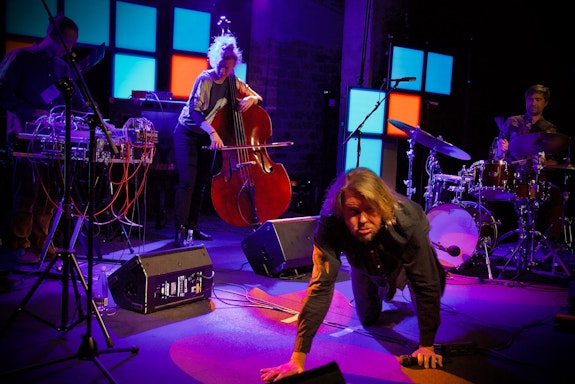Music
The Free Musketeers
October 10, 2020
Tallinn, Estonia
Fotografiska, the Stockholm-based gallery, is rapidly stretching its tentacles out to other cities, with a pair of new locations opening during the last year. There’s an incarnation on Park Avenue that was followed only a few months later by a Tallinn outpost. This lies at the core of Telliskivi Creative City, Estonia’s ever-transforming center of music, art, dance, dining, and boozing. Not the best timing for a beginning, it turned out, with both venues soon interrupted by lockdown pauses, but each of the locations are now open and exhibiting, into 2021.
Before Fotografiska developed its five floors of new space, with a restaurant on top, the building’s ground floor was used as one of the principal venues for Jazzkaar, a long-established festival that usually runs for 10 days each April. That relationship has continued, and the area has been refurbished, expanded, and re-atmosphered, completing an impressive transformation of this former concrete shell in a zone where old factory and warehouse spaces have been given new alternative existences.
Postponed for six months, Jazzkaar’s transplanted October edition was almost as sprawling as its accustomed version, albeit with a distinct lack of American acts. One of its 2020 highlights was provided by The Free Musketeers, a quartet of Estonian improvisers who dug deep into the gizzards of jazz and electronics, pulling out transgressive morsels for abstract reconfiguration. Mingo Rajandi (bass), Ahto Abner (drums), Ekke Västrik (electronics), and Jan Kaus (vocalisations) have become a regular team, but only during the last year or two. Their individual connections stretch back over a decade, though, with Rajandi and Kaus performing as a duo at literary and poetry events. The quartet’s most high profile gig outside Estonia has been at the Huddersfield Contemporary Music Festival in England.
Kaus writes novels, poetry, and essays, but began as a painter, and also plays guitar in a rock combo, as well as teaching at a drama school and Tallinn University. Thus, his performance vocabulary is understandably broad. Rajandi’s reputation as a bandleader is growing fast, having a presence in her more mainline quintet, which also features Abner. Anything would be more mainline than these Musketeers. Västrik is also a member of the spatially colonizing Eesti Elektroonilise Muusika Seltsi Ansambel, caught last August at Tallinn Music Week.
The Free Musketeers filled most of their Fotografiska set with dense activity. Rajandi thumped a fist on her bass’s body, as Abner dropped drum bombs, the pair fluting pulse parts in unison, skinshots a-stutter, stopping, then rattling, with a clipped-beat attention to silent pausing gaps. When Rajandi bowed her bass, it began to sound like a droning Tibetan Buddhist dungchen longhorn. Kaus is theoretically a vocalist, but he veers across song, poetry, narration, intonation, declamation, whispers, and manic outbursts, assisted by a billowing aura of body language, as actor, dancer, mime artist, gestural avant-gardist, and rock’n’roll idiot.
Rarely can an audience witness a performance-art orator who operates on such a multitude of simultaneous levels, from prompting laughter to issuing sonic threats, chatting casually, or barking on the edge of hysteria. Kaus seems to be completely in touch with his primordial childhood, but also has one ear on the rupturing electronic blows, and the free-form jazz burrowing of the bass and drums, holding up the rotten floorboards that would otherwise collapse into an endlessly spiraling downward doom.
Kaus spanked his own arse, sticking it out conspiratorially towards the front row, culminating in a floor-bound writhing, as he continued to shout and moan. Västrik stole Kaus’s utterances for samples, regurgitating them in stacked patterns, lined up alongside their creator’s real-time rambling. The wordsmith always acted as a disruptive element, but it was clear that his constant veering was guided by some vestige of targeted discipline. The only snag during this set was that he could have perhaps slumped into inactivity for just a handful of moments, thereby allowing his cohorts to wander more freely. Even so, the other Musketeers appeared happy to act in the interests of pushing forward their hyperactive showman and his compelling stream of invention. Kaus has expressed a desire to take literature off the page, and onto the immediately live stage, for a direct confrontation with his audience in the here and now instant of the moment. This performance found him levitating well above the printed page, as well as sneaking underneath the bookshelves, crawling clandestinely towards the old record library’s improvised music vinyl-racks.


